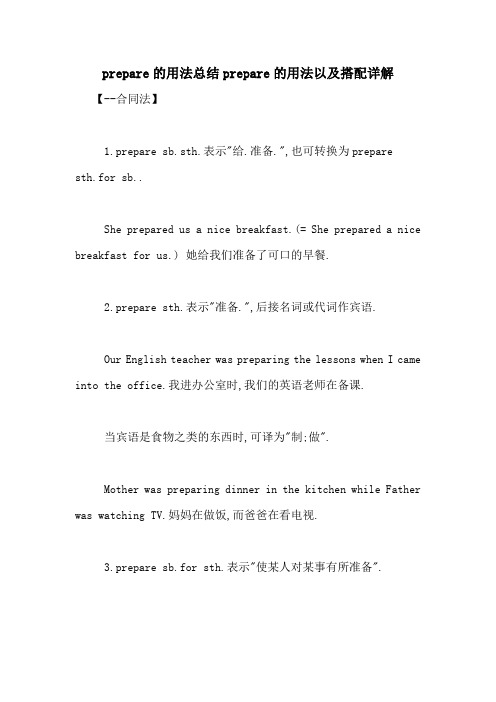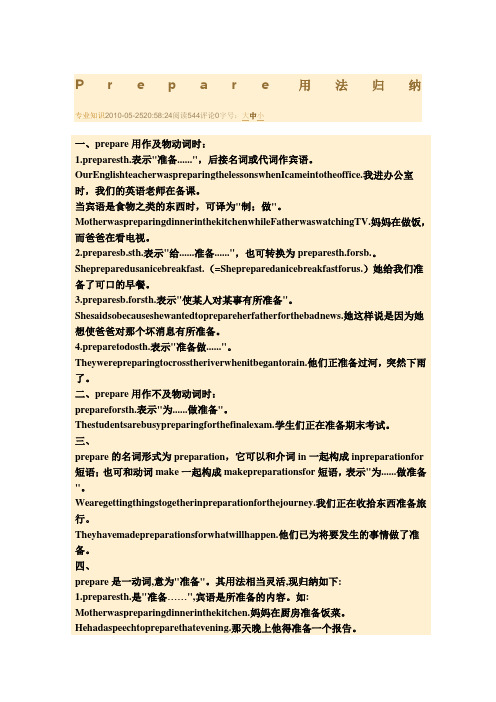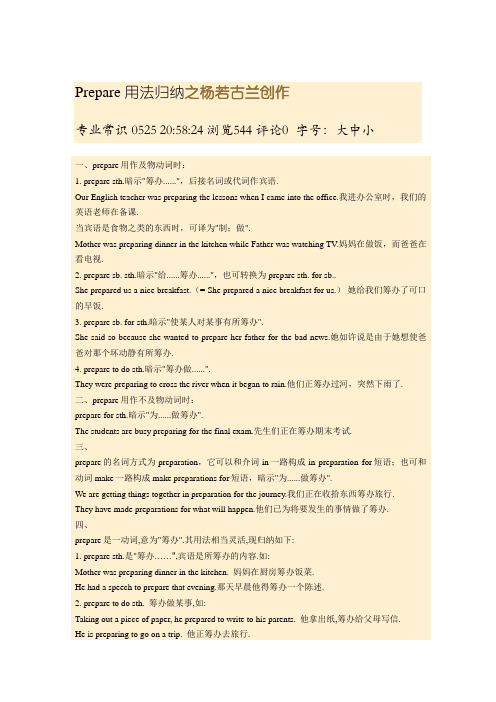Prepare 用法归纳
- 格式:doc
- 大小:20.50 KB
- 文档页数:3

prepare的用法总结prepare的用法以及搭配详解【--合同法】1.prepare sb.sth.表示"给.准备.",也可转换为prepare sth.for sb..She prepared us a nice breakfast.(= She prepared a nice breakfast for us.) 她给我们准备了可口的早餐.2.prepare sth.表示"准备.",后接名词或代词作宾语.Our English teacher was preparing the lessons when I came into the office.我进办公室时,我们的英语老师在备课.当宾语是食物之类的东西时,可译为"制;做".Mother was preparing dinner in the kitchen while Father was watching TV.妈妈在做饭,而爸爸在看电视.3.prepare sb.for sth.表示"使某人对某事有所准备".She said so because she wanted to prepare her father for the bad news.她这样说是因为她想使爸爸对那个坏消息有所准备.4.prepare to do sth.表示"准备做.".They were preparing to cross the river when it began to rain.他们正准备过河,突然下雨了.prepare for sth.表示"为.做准备".The students are busy preparing for the final exam.学生们正在准备期末考试.We are getting things together in preparation for the journey.我们正在收拾东西准备旅行.They have made preparations for what will happen.他们已为将要发生的事情做了准备.1.prepare sth.是"准备……",宾语是所准备的内容.如:Mother was preparing dinner in the kitchen.妈妈在厨房准备饭菜.He had a speech to prepare that evening.那天晚上他得准备一个报告.本文:内容仅供参考。

prepare的用法与搭配
1. "Prepare for something" - 就是为某事做准备呀!比如说,你得prepare for a big test (你得为一场大考试做准备),就像运动员要为重要比赛精心准备一样。
2. "Prepare oneself" - 让自己准备好呀!比如,在面试前,你得 prepare oneself (让自己准备好),这不就跟战士上战场前要调整好状态一个道理嘛!
3. "Prepare to do something" - 准备去做某事呀!哎呀,就像你说你要prepare to go on an adventure (准备去冒险),多刺激!
4. "Be prepared for" - 要对什么有准备呀!好比说,出门得 Be prepared for any weather (对任何天气都要有准备),这不就是未雨绸缪嘛!
5. "Prepare a meal" - 做一顿饭呀!你看,妈妈每天都在厨房 prepare a delicious meal (做一顿美味的饭)给我们,多温馨呀!
6. "Prepare a presentation" - 准备一个报告呀!就像是要在众人面前展示自己的成果,那可得好好 prepare a presentation (准备一个报告),就像精心雕琢一件艺术品!
我觉得呀,掌握好 prepare 的这些用法和搭配,真的能让我们在各种事情面前都更从容不迫呢!。

P r e p a r e用法归纳专业知识2010-05-2520:58:24阅读544评论0字号:大中小一、prepare用作及物动词时:1.preparesth.表示"准备......",后接名词或代词作宾语。
OurEnglishteacherwaspreparingthelessonswhenIcameintotheoffice.我进办公室时,我们的英语老师在备课。
当宾语是食物之类的东西时,可译为"制;做"。
MotherwaspreparingdinnerinthekitchenwhileFatherwaswatchingTV.妈妈在做饭,而爸爸在看电视。
2.preparesb.sth.表示"给......准备......",也可转换为preparesth.forsb.。
Shepreparedusanicebreakfast.(=Shepreparedanicebreakfastforus.)她给我们准备了可口的早餐。
3.preparesb.forsth.表示"使某人对某事有所准备"。
Shesaidsobecauseshewantedtoprepareherfatherforthebadnews.她这样说是因为她想使爸爸对那个坏消息有所准备。
4.preparetodosth.表示"准备做......"。
Theywerepreparingtocrosstheriverwhenitbegantorain.他们正准备过河,突然下雨了。
二、prepare用作不及物动词时:prepareforsth.表示"为......做准备"。
Thestudentsarebusypreparingforthefinalexam.学生们正在准备期末考试。
三、prepare的名词形式为preparation,它可以和介词in一起构成inpreparationfor 短语;也可和动词make一起构成makepreparationsfor短语,表示"为......做准备"。

Prepare的用法Prepare 是一个常用的英语动词,具有丰富的用法和含义。
在这篇文章中,我们将详细探讨“prepare”的各种用法,帮助您更准确、自然地运用这个单词。
首先,“prepare”常见的意思是“准备;预备”。
例如:“I'm preparing for the exam”(我正在为考试做准备。
)这里“prepare for”是一个常见的短语,表示“为做准备”。
再比如:“She prepared a delicious meal”(她准备了一顿美味的饭菜。
)在这个句子中,“prepare”直接接了一个名词,表示“准备某物”。
“Prepare”还可以与不同的介词搭配,形成不同的意思。
除了“prepare for”,还有“prepare to do sth”,表示“准备做某事”。
例如:“Heis preparing to leave”(他正准备离开。
)当我们想要表达“使做好准备;使有准备”时,可以用“prepare sb /sth for sth”这个结构。
比如:“The training prepares the a thletes for the competition”(这次训练使运动员为比赛做好了准备。
)在使用“prepare”时,要注意它的时态和语态变化。
其过去式和过去分词都是“prepared”。
例如:“He prepared the presentation yesterday”(他昨天准备了这个展示。
)“The presentation has been prepared by him”(这个展示已经被他准备好了。
)另外,“prepare”还有一些习惯用语和固定搭配。
比如“prepare onesel f for”,意思是“使自己为做好准备”。
“be prepared to do sth”表示“愿意做某事;准备好做某事”。
在实际运用中,“prepare”的用法非常灵活。

Prepare的用法Prepare 是一个非常常用的英语单词,它有着丰富的用法和含义。
在这篇文章中,我们将详细探讨“prepare”的各种用法,帮助您更好地理解和运用这个单词。
“Prepare”最常见的意思是“准备;预备”。
它可以用作及物动词,也可以用作不及物动词。
当“prepare”用作及物动词时,其后通常接名词或代词作宾语。
比如:“She is preparing dinner”(她正在准备晚餐。
)在这个句子中,“dinner”就是“prepare”的宾语,表示准备的对象是晚餐。
“Prepare”还可以接双宾语,即“prepare sb sth”或“prepare sth for sb”,表示“为某人准备某物”。
例如:“My mother prepared me a nice breakfast” 或者“My mother prepared a nice breakfast for me” 这两个句子意思相同,都是“我妈妈为我准备了一顿美味的早餐。
”除了接名词或代词作宾语,“prepare”还可以接动词不定式作宾语补足语。
比如:“The teacher prepared the students to take the exam”(老师让学生们做好考试的准备。
)当“prepare”用作不及物动词时,常见的搭配有“prepare for”,表示“为做准备”。
例如:“We are preparing for the party”(我们正在为聚会做准备。
)“Prepare”还有“使(自己)有准备;防备”的意思。
比如:“He prepared himself for the bad news”(他让自己做好接受坏消息的准备。
)在使用“prepare”时,需要注意它与一些单词的区别。
比如“prepare”和“get ready”都有“准备”的意思,但“prepare”更强调准备的过程和行动,而“get ready”更侧重于准备好的状态。

Prepare 用法归纳之杨若古兰创作专业常识 0525 20:58:24 浏览544 评论0 字号:大中小一、prepare用作及物动词时:1. prepare sth.暗示"筹办......",后接名词或代词作宾语.Our English teacher was preparing the lessons when I came into the office.我进办公室时,我们的英语老师在备课.当宾语是食物之类的东西时,可译为"制;做".Mother was preparing dinner in the kitchen while Father was watching TV.妈妈在做饭,而爸爸在看电视.2. prepare sb. sth.暗示"给......筹办......",也可转换为prepare sth. for sb..She prepared us a nice breakfast.(= She prepared a nice breakfast for us.)她给我们筹办了可口的早饭.3. prepare sb. for sth.暗示"使某人对某事有所筹办".She said so because she wanted to prepare her father for the bad news.她如许说是由于她想使爸爸对那个坏动静有所筹办.4. prepare to do sth.暗示"筹办做......".They were preparing to cross the river when it began to rain.他们正筹办过河,突然下雨了.二、prepare用作不及物动词时:prepare for sth.暗示"为......做筹办".The students are busy preparing for the final exam.先生们正在筹办期末考试.三、prepare的名词方式为preparation,它可以和介词in一路构成in preparation for短语;也可和动词make一路构成make preparations for短语,暗示"为......做筹办".We are getting things together in preparation for the journey.我们正在收拾东西筹办旅行.They have made preparations for what will happen.他们已为将要发生的事情做了筹办.四、prepare是一动词,意为"筹办".其用法相当灵活,现归纳如下:1. prepare sth.是"筹办……",宾语是所筹办的内容.如:Mother was preparing dinner in the kitchen. 妈妈在厨房筹办饭菜.He had a speech to prepare that evening.那天早晨他得筹办一个陈述.2. prepare to do sth. 筹办做某事,如:Taking out a piece of paper, he prepared to write to his parents. 他拿出纸,筹办给父母写信.He is preparing to go on a trip. 他正筹办去旅行.3. prepare for sth.是"为……做筹办",for是筹办的目的.如:He is busy preparing with great care for the Congress.他们正忙着精心筹办此次代表大会.Hope for the best and prepare for the worst.抱最好的但愿,做最坏的筹办.4. prepare sth. for... 为……筹办某物,如:Please prepare the table for the dinner. 请摆好桌子吃饭.You must prepare a room for the guest. 你必须为客人筹办一个房间.Mr Smith is preparing his speech for the meeting tomorrow. 史密斯师长教师正在为明天会上的讲话做筹办.5. prepare sb. for sth.使某人对……进行筹办,如:We have to prepare the students for that work step by step. 我们要为先生进行这项工作一步步做好筹办.The doctors and nurses are preparing the patient for the operation.大夫和护士们在使病人为做手术而进行筹办.He prepared himself for defeat. 他使本人对失败作好筹办.6. prepare sb. to do sth. 使某人筹办做某事,如:They prepared themselves to accept the defeat.他们筹办好接受失败的结果.Father is preparing my little brother to go to school.父亲为我小弟弟上学做筹办.7. be prepared for sth.=get ready for sth.为……做好了筹办,强调形态.如:They were prepared for the worst. 他们已筹办好了敷衍最坏的情况.He was not prepared for the question. 对这个成绩,他没有做好思想筹办.8. be (well) prepared to do sth. 筹办、打算做某事,如:We are prepared to supply the goods you asked for.我们筹办好供应你要的货物.I'm not prepared to listen to your weak excuses. 我不想听你那站不住脚的借口.9. be prepared against sth. 对……做好筹办,against有"与……作斗争"、"抵御"之意.如:We're fully prepared against any aggression. 我们对任何侵略都做好了充分的筹办.Be prepared against war, be prepared against natural disasters and do everything for the people.备战,备荒,为人民.prepare的名词是preparation,经常使用复数,暗示"具体的筹办工作".如:The preparations for the party took hours.聚会的筹办工作花了几个小时.可以用于以下一些短语:make preparations for 为……做筹办,如:She is making preparations for her marriage.她正在为本人的婚事做筹办.make preparations against sth.为对付/防止……做筹办,如:We must make preparations against natural disasters. 我们必须为防止天然灾祸做筹办.in preparation for 为……做筹办,如:We're getting things together in preparation for the journey.我们正在收拾东西筹办旅行.He is training in preparation for the next football match.他在练习筹办下一轮足球赛.另外,prepare还有"配制、调制(点心、药、菜等)"之意.如: He is preparing a medicine. 他正在配药.。
prepare用法归纳初中以下是 prepare 的用法归纳及双语例句:**一、prepare 的基本用法**1. “prepare”作动词,意为“准备;预备;使做好准备”。
- 常见结构为:prepare sth. 准备某物- 例如:I'm preparing dinner. (我正在准备晚餐。
)- She prepared a beautiful gift for her friend. (她为她的朋友准备了一份漂亮的礼物。
)2. prepare sb. for sth. 使某人对某事做好准备- 如:The training prepared him for the race. (这次训练让他为比赛做好了准备。
)- Our teachers prepare us for the final exam. (我们的老师让我们为期末考试做好准备。
)3. prepare to do sth. 准备做某事- 例如:He is preparing to leave. (他正准备离开。
)- They are preparing to go on a trip. (他们正准备去旅行。
)**二、prepare 的固定搭配**1. prepare oneself for sth. 自己做好某事的准备- 比如:You should prepare yourself for the challenges. (你应该为挑战做好自己的准备。
)- I need to prepare myself for the interview. (我需要为面试做好自己的准备。
)2. be prepared for sth. 为某事做好准备- 像:We are well prepared for the party. (我们为聚会做好了充分的准备。
)- Are you prepared for the bad news? (你为这个坏消息做好准备了吗?)3. be prepared to do sth. 愿意做某事;准备好做某事- 例如:He is prepared to help you at any time. (他随时愿意帮助你。
prepare的用法搭配prepare是一个很有趣而又实用的词,它有多种用法,可以用来描述准备、计划和准备好某件事物等各种含义。
下面介绍一些关于prepare的用法搭配,以便使用者更好的了解其含义和用法。
1.备prepare意为“准备”,常用来描述准备人或物的各种情况,常见的表达有:prepare for, prepare something, and prepare to do something。
例句:We need to prepare for the coming exams.我们需要为即将到来的考试做准备。
2.订prepare还可以用来表示“预订”,常搭配prepare a room,prepare a table等,表示预订客房或者餐桌等。
例句:We prepared a room for the VIP.我们为贵宾准备了一间客房。
3.备prepare也可以用来表示“制备”,常搭配prepare a meal,prepare a presentation等,表示制备一顿饭菜或者制作一份演讲稿等。
例句:She prepared a meal for us.她给我们准备了一顿饭菜。
4.付prepare可以用来表示“应付”,搭配prepare for sth,表示为某件事做准备。
例句:We need to prepare for the recession.我们需要为经济衰退作准备。
5.准备prepare也可以表示“准备做某事”,即准备要做什么事。
例句:We prepared to leave for the airport.我们准备去机场。
6.prepare也可以表示“”,搭配prepare for sth,表示为某件事做。
例句:He prepared for the meeting.他为会议做了。
以上就是prepare的常见用法搭配,有了这些用法搭配,使prepare成为一个非常实用的词汇,可以用在很多场合,包括日常生活之中。
prepare的用法及搭配一级标题:引言在英语学习中,词汇的正确使用是提高语言表达能力的关键之一。
当我们追求更加准确、丰富的表达时,了解一个词的不同用法及其搭配就显得尤为重要。
在本文中,我们将探讨动词“prepare”的不同用法及其常见的搭配。
二级标题1:表示准备行动“prepare for”“Prepare”作为一个常见的动词,在表达准备行动时经常与介词“for”搭配使用。
该结构可以表示为“prepare for + 名词/动名词”。
例如,1. I need to prepare for the interview tomorrow.明天我需要准备面试。
2. They prepared carefully for the upcoming exam.他们为即将到来的考试做了充分的准备。
在这些例句中,“prepare for”强调在某种行动或事件之前做好准备。
二级标题2:表示准备食物“prepare a meal/dish”除了表示行动之外,“prepare”还被广泛用于描述准备食物。
“Prepare a meal/dish”可以指制作一顿饭或烹饪某个菜肴。
例如,1. She’s preparing a delicious meal for us.她正在给我们做一顿美味的饭菜。
2. He loves preparing Italian dishes.他喜欢准备意大利菜。
这些例句中,“prepare”表示在厨房里制作食物的过程,强调的是烹饪的环节。
二级标题3:表示准备材料或情况“prepare something/somebody”此外,“prepare”还可以指为某事物或某人做好准备。
其宾语既可以是具体的事物,也可以是抽象概念。
例如,1. He is preparing the documents for the meeting.他正在为会议准备文件。
2. They prepared a surprise party for her birthday.他们为她的生日准备了一个惊喜派对。
prepare的用法及短语
嘿,朋友!你知道“prepare”这个单词吗?它可是英语里挺常用的一个词呢!
“prepare”作动词,意思是“准备;预备”。
比如说,“I'm preparing for the exam.”(我正在为考试做准备。
)这是不是很常见呀?
它常见的用法有不少。
比如“prepare sth.”,就像“He is preparing a meal.”(他正在准备一顿饭。
)再比如“prepare for sth.”,“We are preparing for the party.”(我们正在为聚会做准备。
)
还有“prepare to do sth.”,“She prepares to go shopping.”(她准备去购物。
)
“prepare”组成的短语也不少呢!像“prepare oneself for”,“You should prepare yourself for the challenge.”(你应该为挑战做好自己的准备。
)还有“be prepared to do sth.”,“I'm prepared to help you.”(我准备好帮助你了。
)
你想想,准备是不是在生活中到处都有啊?就像运动员在比赛前要精心准备,才能在赛场上发挥出色;学生在考试前认真准备,才能取得好成绩。
这不就跟我们做饭前要准备食材,出门前要准备物品一样吗?
所以说,掌握“prepare”的用法和相关短语真的太重要啦!它能让我们更准确、更生动地表达自己的想法和计划。
你觉得呢?。
P r e p a r e用法归纳
一、prepare用作及物动词时:
.表示"准备......",后接名词或代词作宾语。
OurEnglishteacherwaspreparingthelessonswhenIcameintotheoffice.我进办公室
时,我们的英语老师在备课。
当宾语是食物之类的东西时,可译为"制;做"。
MotherwaspreparingdinnerinthekitchenwhileFatherwaswatchingTV.妈妈在做饭,
而爸爸在看电视。
表示"给......准备......",也可转换为.。
Shepreparedusanicebreakfast.(=Shepreparedanicebreakfastforus.)她给我们准
备了可口的早餐。
表示"使某人对某事有所准备"。
Shesaidsobecauseshewantedtoprepareherfatherforthebadnews.她这样说是因为她
想使爸爸对那个坏消息有所准备。
.表示"准备做......"。
Theywerepreparingtocrosstheriverwhenitbegantorain.他们正准备过河,突然下雨
了。
二、prepare用作不及物动词时:
prepareforsth.表示"为......做准备"。
Thestudentsarebusypreparingforthefinalexam.学生们正在准备期末考试。
三、
prepare的名词形式为preparation,它可以和介词in一起构成inpreparationfor
短语;也可和动词make一起构成makepreparationsfor短语,表示"为......做准备
"。
Wearegettingthingstogetherinpreparationforthejourney.我们正在收拾东西准备旅
行。
Theyhavemadepreparationsforwhatwillhappen.他们已为将要发生的事情做了准
备。
四、
prepare是一动词,意为"准备"。
其用法相当灵活,现归纳如下:
.是"准备……",宾语是所准备的内容。
如:
Motherwaspreparingdinnerinthekitchen.妈妈在厨房准备饭菜。
Hehadaspeechtopreparethatevening.那天晚上他得准备一个报告。
.准备做某事,如:
Takingoutapieceofpaper,hepreparedtowritetohisparents.他拿出纸,准备给父母写
信。
Heispreparingtogoonatrip.他正准备去旅行。
.是"为……做准备",for是准备的目的。
如: HeisbusypreparingwithgreatcarefortheCongress.他们正忙着精心准备这次代表大会。
Hopeforthebestandpreparefortheworst.抱最好的希望,做最坏的准备。
为……准备某物,如:
Pleasepreparethetableforthedinner.请摆好桌子吃饭。
Youmustpreparearoomfortheguest.你必须为客人准备一个房间。
MrSmithispreparinghisspeechforthemeetingtomorrow.史密斯先生正在为明天会上的讲话做准备。
使某人对……进行准备,如: Wehavetopreparethestudentsforthatworkstepbystep.我们要为学生进行这项工作一步步做好准备。
Thedoctorsandnursesarepreparingthepatientfortheoperation.医生和护士们在使病人为做手术而进行准备。
Hepreparedhimselffordefeat.他使自己对失败作好准备。
使某人准备做某事,如:
Theypreparedthemselvestoacceptthedefeat.他们准备好接受失败的结果。
Fatherispreparingmylittlebrothertogotoschool.父亲为我小弟弟上学做准备。
.=getreadyforsth.为……做好了准备,强调状态。
如: Theywerepreparedfortheworst.他们已准备好了应付最坏的情况。
Hewasnotpreparedforthequestion.对这个问题,他没有做好思想准备。
(well)preparedtodosth.准备、打算做某事,如: Wearepreparedtosupplythegoodsyouaskedfor.我们准备好供应你要的货物。
I'mnotpreparedtolistentoyourweakexcuses.我不想听你那站不住脚的借口。
.对……做好准备,against有"与……作斗争"、"抵御"之意。
如:
We'refullypreparedagainstanyaggression.我们对任何侵略都做好了充分的准备。
Bepreparedagainstwar,bepreparedagainstnaturaldisastersanddoeverythingforthe people.备战,备荒,为人民。
prepare的名词是preparation,常用复数,表示"具体的准备工作"。
如: Thepreparationsforthepartytookhours.聚会的准备工作花了几个小时。
可以用于以下一些短语:
makepreparationsfor为……做准备,如: Sheismakingpreparationsforhermarriage.她正在为自己的婚事做准备。
makepreparationsagainststh.为对付/防止……做准备,如: Wemustmakepreparationsagainstnaturaldisasters.我们必须为防止自然灾害做准备。
inpreparationfor为……做准备,如:
We'regettingthingstogetherinpreparationforthejourney.我们正在收拾东西准备旅行。
Heistraininginpreparationforthenextfootballmatch.他在训练准备下一轮足球赛。
另外,prepare还有"配制、调制(点心、药、菜等)"之意。
如: Heispreparingamedicine.他正在配药。